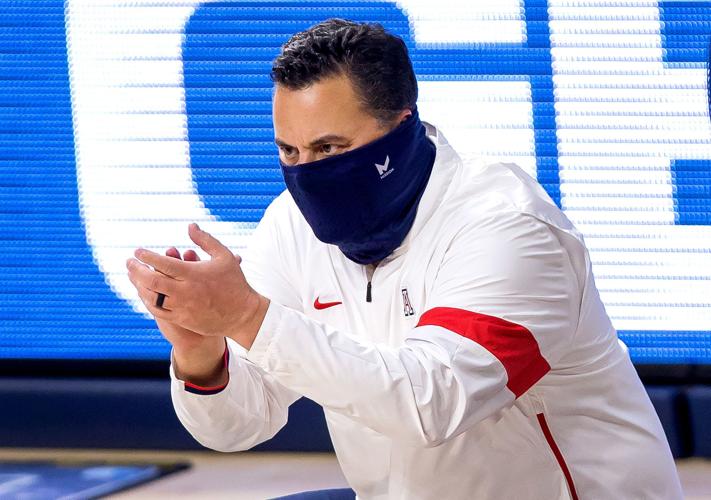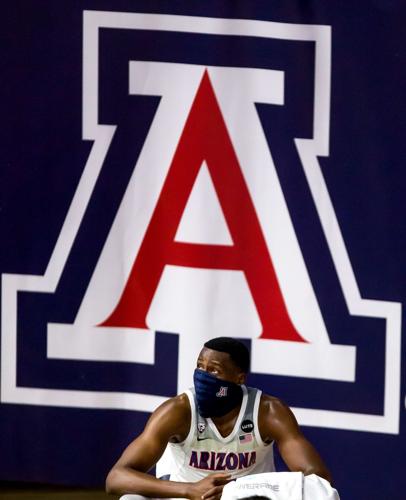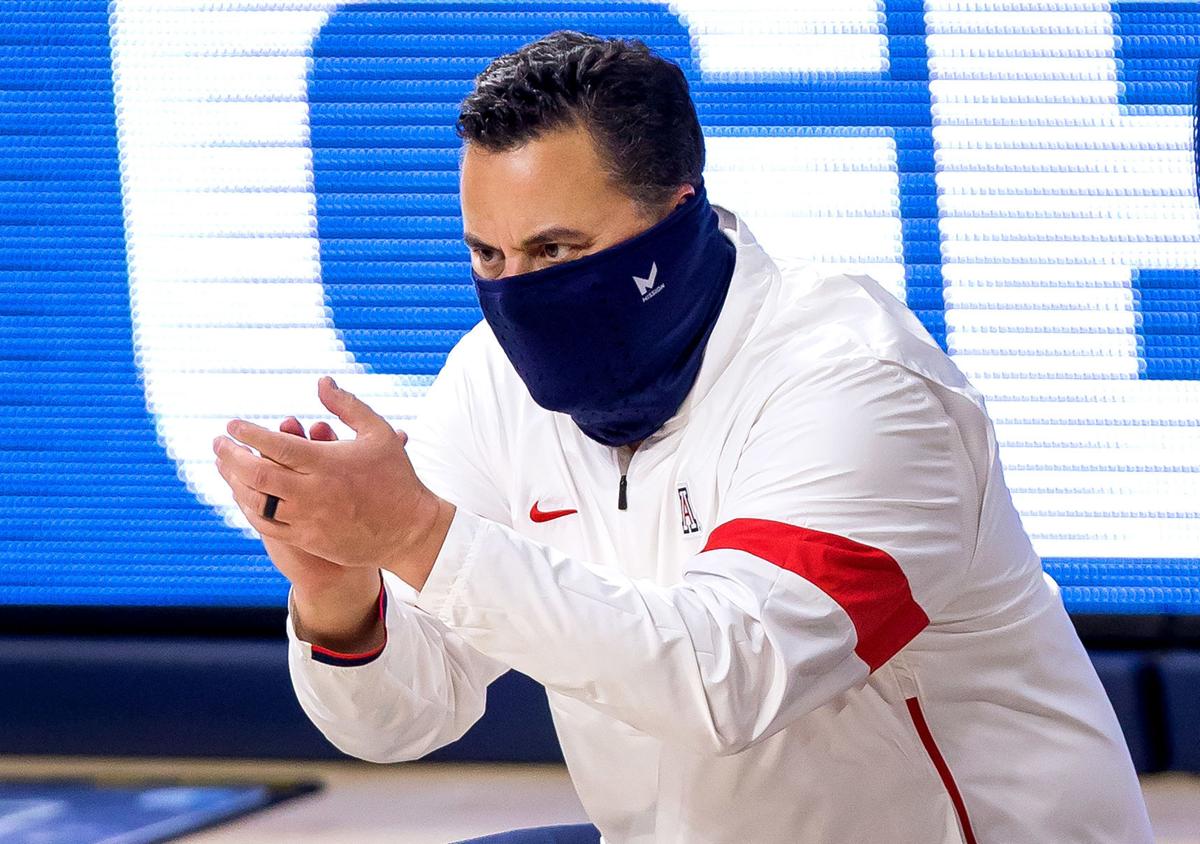Arizona is 6-1 on the court so far, and the Wildcats are even better in the metric that might matter most this season.
Of their seven postponed or canceled games so far, none have been a result of positive test within the UA program.
That’s a COVID-19 score of 7-0. Undefeated.
At least for now.
“I’m not eager to answer the question of, ‘Hey, we’re doing great, great things,’” UA coach Sean Miller said, but also adding, “clearly the results of our team should at least tell you that we’re trying hard to do things the right way.”
The hard way. Like getting up nearly every day at 6 a.m. for a COVID-19 test, eating team meals apart and generally limiting all social interaction, whether with teammates or friends or family.
The Wildcats can’t even have their families come watch their games anymore, with that option removed after their Nov. 27 opener, decreasing the possibility that their families will want to hang out with players before or after the game.
“We know that we can’t do everything that other people might be able to do because we have to stay healthy so that we don’t have any games canceled or be shut down,” guard James Akinjo said. “It hasn’t been easy but we’re sacrificing, and we got it right.”
There’s really no other choice if a team wants to remain on the court consistently, especially for teams in areas that are seeing COVID-19 surges as Pima County is.
Living and playing inside what is essentially a quasi-bubble is all but required.
“Quite honestly, our student-athletes are not completely isolated from the general community that they live in and there will be episodes where they will be identified as close contacts of a general student or somebody in the general community,” said Doug Aukerman, Oregon State’s senior associate athletic director for sports medicine and chair of the Pac-12’s Student-Athlete Health and Well-Being Initiative.
“It just highlights that by far that the biggest time of risk for our student athletes and our staff is not necessarily when they’re involved in athletic endeavors, but in the social interaction outside of it.”

Arizona Wildcats center Christian Koloko (35) look at the score board while taking a break on the bench during the second half of the Arizona Wildcats vs Cal State Bakersfield Roadrunners men's basketball game at McKale Center, 1721 E. Enke Dr., in Tucson, Ariz. on Dec. 9, 2020. Arizona won 85-60.
Which means creating an even more restrictive environment than local health authorities allow. On the road in California last weekend, every Arizona player was assigned his own room instead of doubling up. While there, the team chartered two buses for the ride from San Jose to Santa Cruz to allow players to sit at least six feet apart.
They were given most of their meals in boxes. Their “pregame meal” before playing Stanford last Saturday was simply a room service platter placed in front of every player’s door; their postgame meal was a cardboard box of chicken tacos distributed at the arena.
At home, the Wildcats don’t venture out much more. They don’t eat in restaurants and don’t even have team meals together, while meetings are shortened and participants reduced.
“Everything’s really to go. Everything’s in a box,” Miller said. “When we’re in a closed space, we have the doors wide open. We’re in a clean area. We all have masks on. We try to do things in shorter bursts — if you were in a film (room) for a 20 minute session, I think that’s been cut in half to 10.
Things are so restrictive that starting wing Dalen Terry said his toughest adjustments as a freshman this season so far have not been on the court, but off it.
“Being basketball players, we know around town there’s a lot of eyes on us so we really cannot be seen messing up,” Terry said. “So we try to stay out of the public as much as possible. We go get our food to go and come back home. If we’re on University (Boulevard), we go get our food from there and come right back home.
“We don’t really do a lot of things that’s going to risk our chances of getting COVID because we all want to play.”
As the Wildcats have seen with teams such as New Mexico State, Northern Colorado and Cal Baptist that were supposed to come into McKale Center but ultimately had to cancel because of COVID-19 issues, only one positive test is often enough to derail an entire team.
Pac-12 guidelines recommend playing with a minimum of seven scholarship players. Since teams have a maximum of 13 scholarships, having seven players knocked out by a positive test or contact tracing can do the trick.
“One thing for certain is that we are seeing that this is clearly a different sport than football,” Aukerman said. “The impact of losing six or seven people in football doesn’t necessarily stop a game, whereas it’s maybe more than half your team in basketball. The impact is much greater.”
Once a member of a team’s traveling party is confirmed to have tested positive, anybody he or she has had close contact with for a cumulative 15 minutes over the previous 24 hours can also be sidelined via contact tracing.
“Ideally, you’re gonna (look at) interactions within the athletic realm but also socially,” Aukerman said. “You’re looking who are their roommates, where do they go to dinner and how did they spend their time. What the previous negative test does is helps reassure you, to some degree, that you are picking this up in the early stages.”
But a negative test the day prior to a positive doesn’t always help games from getting canceled. Just one practice together, or too many guys sitting together for a meal or a video game, and things can get shut down.
The possibilities are so frightening for a coach that Miller relies on UA’s medical team and tries not to overthink it.
“If I start thinking about COVID and roommates,” Miller said, pausing, “I mean, your head explodes.”
While UA players are not formally restricted off the court, they repeatedly are made aware how their actions can affect the team — and that meeting with people outside the program increases the odds depending on where those people have been.
The Wildcats spent an extended postgame session after beating Montana on Tuesday night discussing their three-day break ahead, during which they will be remaining in Tucson but mostly staying apart.
“We’re trying to do things but I don’t even want to act like we do things any better than anybody else,” Miller said. “We’re just doing the best we can in this environment.”
If that isn’t good enough, if the odds swing against the Wildcats at some point, Miller said he’s also educated his players on that possibility, too.
“It’s just the collective responsibility of the group, doing the best that they can and following the same rules that (everyone is) trying to follow,” Miller said.
“Having said that, you could try to be perfect, but when you get it, if you get it, that doesn’t mean you didn’t follow protocol. What I worry about is one of our players getting it and feeling the guilt that they’ve impacted teammates because they did something wrong.
“Look, we’re all trying the best we can, but we’re going to be impacted. And when that time comes, that’s the next challenge for us to handle that as well as we can, and then bouncing back and returning to form. But nobody really knows what that future holds.”






